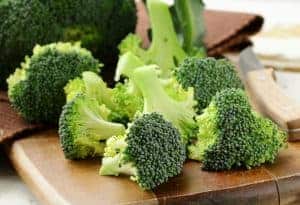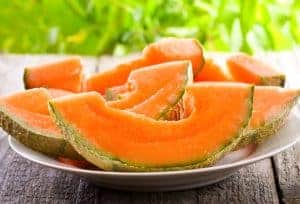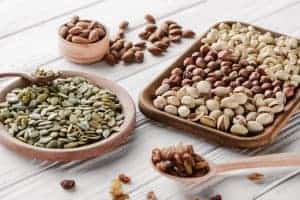Time To Read: 11 minutes
Good health also equals good hearing. We take a look at the vitamins and minerals indicated in good hearing health and share come of our favourite recipes rich in these foods!
We’ve all heard that carrots are good for our eyesight, but did you know that bananas are good for your ears?
There are lots of foods which help keep your ears healthy and the great news is, you probably already have a lot of these foods already in the kitchen.
Let’s take a look at five key vitamins and minerals, discover which foods are rich in those elements and explore a few recipes:
Folic Acid
Folate is a water-soluble B vitamin which is most commonly associated with pregnant women to prevent miscarriage and neural tube defects.
It's also used in the treatment of serious kidney disease and dealing with high levels of homocysteine linked to heart disease and stroke.
It is also considered effective for high blood pressure and even age-related macular degeneration.
A randomised, controlled trial conducted in 2004 found folic acid supplementation slowed the decline in hearing of the speech frequencies associated with aging.
Foods which are high in folic acid include:
- Asparagus
- Beets
- Broccoli
- Brussels Sprouts
- Citrus Fruits
- Eggs
- Leafy Greens
- Legumes
Magnesium
Magnesium is a mineral that helps make protein, bone and DNA. It also helps regulate muscle and nerve function, blood sugar levels and blood pressure.
And recent studies suggest that it might provide some relief from tinnitus:
The study showed that tinnitus sets in at a specific sound frequency, after the experience of loud sound exposure. The researchers discovered that a high magnesium diet can prevent the dorsal cochlear nucleus from turning the dials all the way up and locking this frequency in place as a ‘memory’.
A separate study found the same benefits in either preventing or mitigating hearing damage.
Foods that are high in magnesium are:
- Artichokes
- Asparagus
- Avocado
- Bananas
- Broccoli
- Brussel Sprouts
- Cabbage
- Chickpeas
- Green leafy vegetables
- Nuts and seeds
- Seafood (such as salmon, mackerel, tuna)
Omega 3 Fats
There are a lot of benefits in Omega 3 fats and no doubt you are familiar with some of them.
In brief, Omega-3 fatty acids are essential nutrients the body uses in a variety of ways to maintain health and in some cases help regulate mood.
With respect to hearing, the importance of omega-3 fatty acids and fish consumption on the risk of age-related hearing loss has been demonstrated in a number of studies.
One in particular showed that dietary intervention with omega-3 fatty acids may be useful in preventing or delaying the development of age-related hearing loss. These benefits may be related to the ability of polyunsaturated fatty acids to promote healthy auditory function through the maintenance of adequate vascular supply to the cochlea. Additionally, polyunsaturated fatty acids attenuate inflammatory processes, decrease blood pressure and improve vascular reactivity or endothelial function.
Foods high in Omega-3 are:
- Fish and other seafood (especially cold-water fatty fish, such as salmon, mackerel, tuna, herring, and sardines)
- Nuts and seeds (such as flaxseed, chia seeds, and walnuts)
- Plant oils (such as flaxseed oil, soybean oil, and canola oil)
Potassium
Potassium is considered one of the most important minerals in the body. It helps regulate fluid balance, muscle contractions and nerve signals. Moreover, a high-potassium diet may help reduce blood pressure and water retention, protect against stroke and prevent osteoporosis and kidney stones.
“The inner ear is especially sensitive to any disruption in potassium levels,” said Robert D. Frisina, Ph.D., professor of Otolaryngology at the University of Rochester Medical Center and an adjunct professor at Rochester Institute of Technology. “We know that potassium levels in the inner ear seem to decrease as we age and that these falling levels play a role in age-related hearing loss, and we also know that blood levels of aldosterone generally decrease with age.
“We found a direct link between blood levels of aldosterone and the ability of people to hear normally as they age. Depressed hormone levels may hurt hearing both in the inner ear and the part of the brain used for hearing.”
Potassium regulates the fluid in your inner ear which is important because as we age these levels tend to drop which can contribute to hearing loss or presbycusis. The more scientifically minded might be interested in this fascinating study that looks at the mechanics of potassium-ion movement in the inner ear.
Foods which are high in potassium are:
- Apricots
- Bananas
- Broccoli
- Cucumbers
- Dates
- Grapefruit
- Honeydew melon
- Rockmelon
- Mushrooms
- Potatoes
- Spinach
- Sweet Potato
Zinc
Zinc is an essential micronutrient, which has a role in the optimal functioning of the immune system and resistance to infection. It must be consumed regularly as it cannot be stored in the body.
A study investigated the role of zinc in treatment of tinnitus. Clinically favorable progress was detected in 46.4% of patients given zinc. Although this decrease was not statistically significant, the severity of subjective tinnitus decreased in 82% of the patients receiving zinc. Patients with tinnitus may have low blood zinc levels (31%) and clinical and subjective improvement can be achieved by oral zinc medication.
Foods high in zinc are:
- Dairy
- Eggs
- Legumes including chickpeas, lentils and beans
- Meat
- Nuts
- Shellfish
- Whole Grains
Recipes to try
Salmon and Dressed Spinach
1 bunch asparagus, ends trimmed
200g roasted salmon fillet, flaked
150g baby spinach leaves
1 avocado, flesh sliced
1 tablespoon olive oil
2 tablespoons lime juice
2 teaspoons brown sugar
Sesame seeds, to garnish
Whisk together brown sugar, lime juice and olive oil.
Trim and blanch asparagus and refresh under cold water and pat dry and add it to avocado, spinach and salmon and toss. Mix through dressing. Serve and garnish with sesame seeds.
Tomato, Lentil, Feta and Spinach on Sourdough
2 tablespoons currants
1 tablespoon red wine vinegar
300g vine-ripened cherry tomatoes
2 tablespoons olive oil
2 garlic cloves, crushed
1 teaspoon dried oregano
200g baby spinach leaves, thinly sliced
400g can brown lentils, rinsed, drained
Finely grated zest and juice of 1 lemon
4 slices sourdough, toasted
150g full cream feta, crumbled
Toasted flaked almonds, to serve
Preheat the oven to 200°C. Soak the currants in vinegar for 30 minutes, then drain and set aside.
Place tomatoes on a baking tray, season, then drizzle with 1 tablespoon oil. Roast for 5 minutes or until just softened and skins are starting to split. Set aside.
Heat remaining 1 tablespoon oil in a large pan over medium heat. Add garlic and oregano, then cook for 1 minute or until fragrant. Add spinach and cook for 1 minute or until wilted. Add lentils, zest and juice. Season and cook for 1 minute or until warmed through.
Divide toast among plates, then top with spinach mixture. Garnish with currants, tomato, feta and almonds, then serve.
Tasty Greens Salad
2 tablespoons sesame oil
1 tablespoon olive oil
1 tablespoon cider or white wine vinegar
1 firm ripe avocado, roughly chopped
1 punnet alfalfa
1/2 red onion, thinly sliced
100g baby spinach leaves
1 teaspoon sesame seeds
1 tablespoon pumpkin seeds
Whisk the oils and vinegar together. Season to taste. Add the remaining ingredients to the bowl and toss gently to combine. Pile the salad onto a large platter and serve.
Slow Cooker Vegetable Stew
1 can of beans (red beans or Cannellini beans) drained
2 tablespoons extra-virgin olive oil
2 large onions, finely chopped
2 stalks celery, finely chopped
2 large carrots, finely chopped
1 tin of crushed tomatoes
2 teaspoons dried oregano
1 teaspoon salt
Dash cayenne pepper
Freshly ground pepper, to taste
Saute onions, celery and carrots for 3 to 5 minutes and put in a slow cookers along with beans, tomatoes and enough water to cover. Season with salt and pepper and add a dash of cayenne pepper to taste.
Tropical Salad
2 lady finger bananas, peeled and sliced
1 nashi or firm pear, peeled, cored and sliced
2-3 thick slices of pineapple, peeled and cut into wedges
2 Lebanese cucumbers, diced
Seedless green grapes
2 shallots or 1⁄2 red salad onion, sliced
1⁄4 red capsicum, finely shredded
1 ½ tablespoons chopped coriander, mint or basil
2 tablespoons soft brown sugar
2 tablespoons lime or lemon juice
1 tablespoons fish sauce or light soy sauce
Combine the prepared fruit and salad vegetables in a bowl and toss lightly. In a small bowl, combine the sugar, lime or lemon juice and fish or soy sauce, mixing well. Pour over salad and toss lightly.
Further reading
When hearing aids are an integral part of your lifestyle, it helps you get the most out of life. We share some lifestyle articles here:
- The colour of noise
- The history of hearing aids
- Safe driving with hearing loss
- Bright prospects for metal detectorists and gold prospectors
- Why TV Commercials Sound Louder Than The Programs
- Why It’s Important To Overcome Social Isolation After Hearing Loss
- How to talk to a loved one about hearing loss
- Earprints as Unique as fingerprints
- How to Successfully Travel with Hearing Aids
- Did I just hear that right? (Misheard song lyrics)
- Putting sound in movies
- Famous people who wear hearing aids





